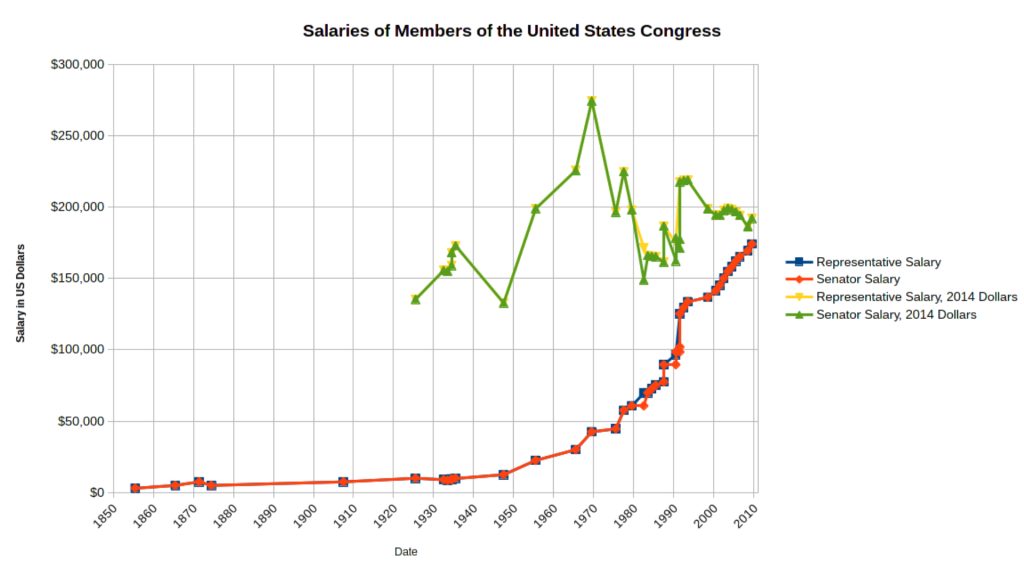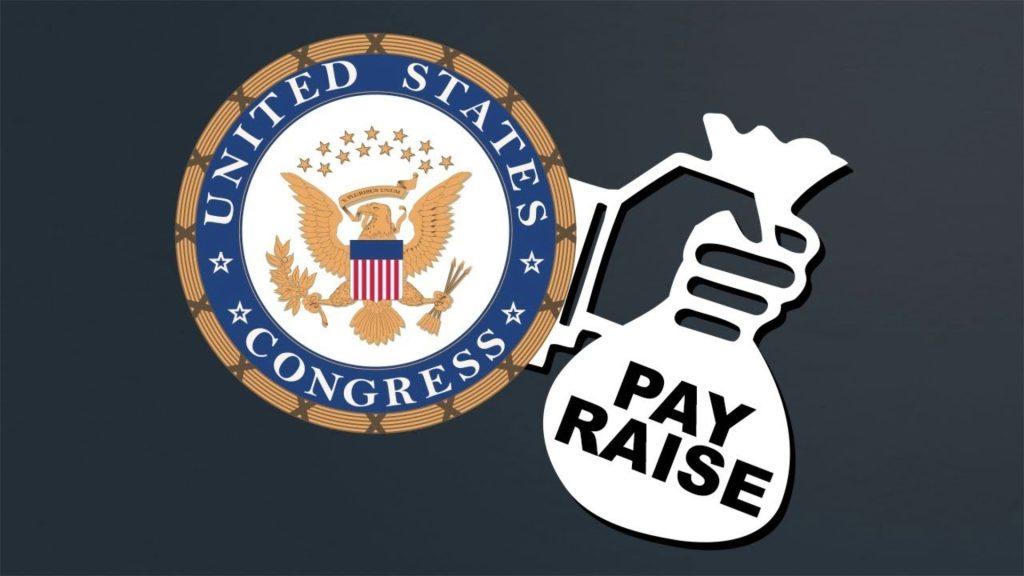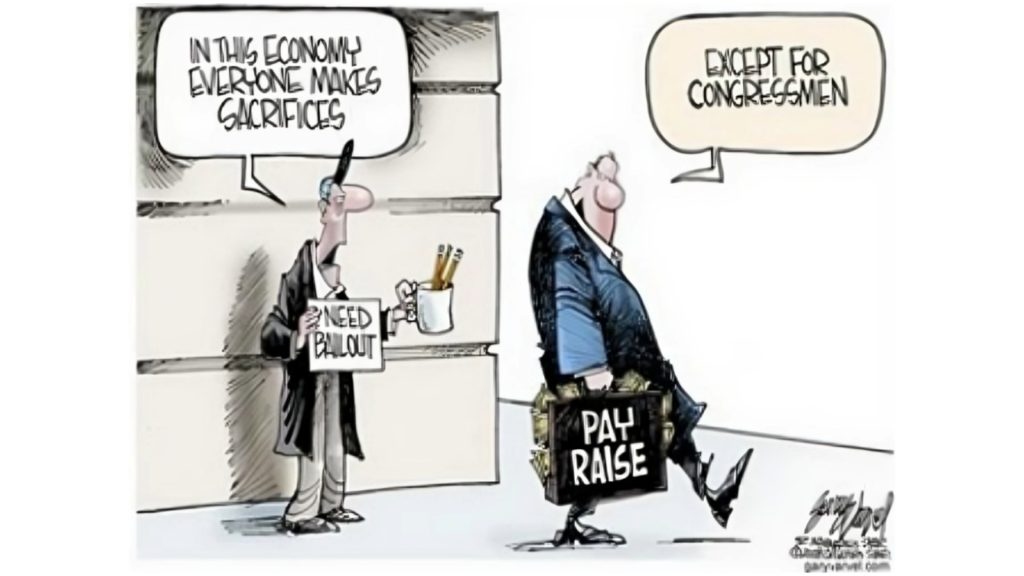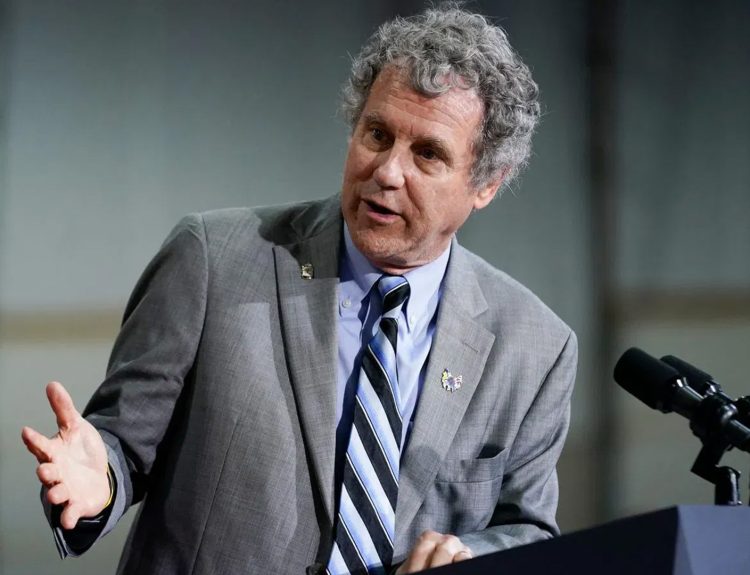A new class-action lawsuit claims Congress is violating the U.S. Constitution by denying lawmakers annual cost-of-living raises to their $174,000 salaries.
The suit argues that by blocking the raises without an election happening in between, Congress is improperly “varying” member compensation in violation of the 27th Amendment.
Lawsuit Seeks $50 Million in Back Pay for Lawmakers
Congress voted again this year to deny lawmakers an automatic cost of living increase in their $174,000 annual salaries, as it has done routinely since 2009.

According to a new lawsuit, this longstanding practice violates the Constitution and entitles current and former members of Congress to $50 million in back pay.
Class Action Suit Filed By Ken Cuccinelli
The class-action suit was filed by Ken Cuccinelli, a former Trump administration official, on behalf of Rep. Rick Crawford (R-Ark.) and three former lawmakers from both parties.

It argues that by blocking the modest pay increase lawmakers would otherwise receive each year, Congress has effectively cut their pay, violating the 27th Amendment.
The 27th Amendment and Congressional Salaries
According to the lawsuit, Congress has violated the 27th Amendment by denying the cost of living adjustments to lawmakers’ $174,000 annual salary since 2009.

The suit argues that because salaries have remained stagnant, they have essentially been “varied” and suppressed over time due to inflation, violating the Amendment.
Cuccinelli Argues It Is Impossible To Be In Congress With Abismal Salaries
Ken Cuccinelli, the lawyer leading the suit, claims, “You’ve got a situation now where you either have to be rich to go into Congress, or you have to sacrifice your family.” Lawmakers usually have to maintain two residences, so their static pay makes this difficult.

The lawsuit calculates that the ex-lawmakers it represents are owed hundreds of thousands each in back pay. Estimating that around 1,800 current and former lawmakers have been impacted, the total damages sought come to $50 million.
Public Perception
While raising lawmakers’ pay could help address legitimate concerns like attracting qualified candidates, polling shows Americans consistently oppose increases to Congressional salaries.

The perception is often that politicians are overpaid, elite, or corrupt. However, suppressing politicians’ pay could make public office inaccessible to all but the wealthy. It also risks fostering financial temptation, as some research links higher salaries for politicians to lower corruption.
Requested Back Pay Could Total $50 Million
The lawsuit estimates that about 1,800 current and former lawmakers have been affected and are owed roughly $50 million in total damages from the government.

For example, they calculate that Democratic Rep. Ed Perlmutter is owed $753,300, Republican Rep. Rodney Davis is owed $563,800, and former Republican Rep. Tom Davis is owed $268,839.
Avoiding Voter Backlash
According to experts, rank-and-file members of Congress would earn over $210,000 today if their pay had simply kept up with inflation.

But lawmakers fear voter anger over “giving themselves a raise,” even a modest one, so they’ve denied this increase for over a decade.
Questioning the Strategy’s Effectiveness
Some argue that holding salaries flat hasn’t reduced public cynicism about Congress and that voters prefer lawmakers focus on other issues.

Regular, modest pay increases tied to inflation may seem more reasonable and help attract qualified candidates from a wider range of socioeconomic backgrounds.
The 27th Amendment Is An Unconstitutional Tactic?
The most compelling argument in favor of raising lawmaker pay is that the current practice of voting to block cost of living adjustments may violate the 27th Amendment.

Ratified in 1992, this Amendment prohibits Congress from changing its pay in the same legislative session that the change would take effect. By denying inflation adjustments year after year, Congress may be unlawfully decreasing lawmakers’ pay.
Raising Salaries Poses A lot of Complexities
Raising politicians’ salaries is a complex issue with reasonable arguments on both sides. However, suppressing lawmakers’ pay for political gain raises constitutional questions and may be counterproductive.

A more balanced solution may be implementing automatic inflation adjustments, as recommended by good governance groups, to avoid unreasonable pay decreases and the appearance of lawmakers giving themselves raises.
Will The Lawsuit An End to Suppression?
The lawsuit aims to end what the plaintiffs see as the unconstitutional suppression of lawmakers’ wages.

Raising congressional pay has been an issue lawmakers themselves have long avoided. However, this new lawsuit seeks to force the matter by requiring Congress to follow its rules and provide the annual COLA as the law prescribes.
Keeping Talent in Congress With Better Compensation
Without salary increases to match inflation, Congress risks losing qualified candidates who cannot afford to maintain two households on a stagnant salary.

As Cuccinelli points out, lawmakers typically keep residences in D.C. and their home state, an expensive proposition.
Voting To Increase Salary After Upcoming Elections
To remedy the situation, Congress could approve automatic cost-of-living adjustments to lawmakers’ pay to keep up with inflation, as the lawsuit argues the Constitution requires.

They could also vote to increase pay after the next election, as specified in the 27th Amendment. While politically risky, modest pay increases could help prevent a “brain drain” in Congress and allow more candidates from diverse socioeconomic backgrounds to run for office.
Are Politicians Out of Touch?
At the end of the day, whether this lawsuit succeeds or not, it will likely continue to fuel the public perception that politicians are out of touch with the economic realities faced by ordinary Americans.

While there are reasonable arguments on both sides regarding Congressional salaries, the majority of voters struggling to make ends meet will probably see this as just another example of the political class trying to line their pockets.






